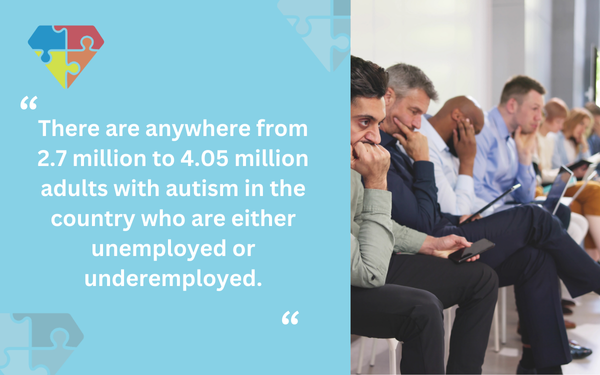Can People with Autism Have Successful Careers?
While people with autism spectrum disorder (ASD) often face deficits in communication and social interaction, they possess many extraordinary skills. The talents that they have, in fact, make them uniquely qualified in many ways to be valuable members of an organization.
Yet, there are many challenges that people with autism face in terms of gaining and maintaining employment. Job opportunities for people with autism are often a lot less than they are for neurotypical individuals, which leads to a much higher unemployment rate among the population.
Despite this high unemployment rate, many people with autism can have very successful careers. They may require certain accommodations and support, but they can prove to contribute immensely to an organization that gives them the chance.
Table Of Contents
Why is the Unemployment Rate So High for People with Autism?
It’s estimated that the U.S. unemployment and underemployment rate for people on the autism spectrum ranges from 50% to 75%. That’s significantly higher than the overall unemployment rate, which as of January 2025 was 4%.
Since there are more than 5.4 million adults with ASD living in the U.S., that means that there are anywhere from 2.7 million to 4.05 million adults with autism in the country who are either unemployed or underemployed.

A big reason for this is the stigma that surrounds autism. Many employers believe that individuals with autism simply don’t have the skills, the social graces or both to handle certain jobs, so they don’t hire them for those jobs.
That’s unfortunate, because they are missing out on the immense benefits that hiring an individual with autism can bring to their company.
What People with Autism Contribute to a Company?
While ASD is a neurodevelopmental disorder that affects how individuals process information, learn and behave, it also contributes to individuals having a unique set of skills that perfectly meet the needs of many organizations.
For instance, people with autism often pay great attention to detail. They often have the ability to focus on their tasks quite well and excel in solving problems.

People with autism are also considered highly creative individuals, and this gives them the ability to think much differently than neurotypical individuals. In the workplace, this can benefit them as they bring new perspectives to the organization, which can often result in new ideas and innovative solutions to problems.
These skills and traits would surely benefit any organization, regardless of what industry they’re in.
What Challenges Might People with Autism Face in the Workplace?
There are, of course, some challenges that people with autism might face in the workplace. Just like they have unique strengths, they also often have unique needs.
Employers can help support their employees with autism better by understanding what these challenges might be, and offering certain accommodations to them in response.
Two of the most common challenges individuals with autism face are deficits in communication and social interactions. It might be difficult for them, for example, to process and understand verbal and non-verbal communication, and they might feel anxious and/or uncomfortable when having to interact with other people.
As such, individuals with autism often perform best in roles where they can work independently most of the time, rather than in larger team environments.
Some people with autism may also struggle with sensory sensitivities. They could become overwhelmed, stressed and/or anxious by loud noises, strong odors, bright lights and certain textures.
Traditional workplaces may pose unique challenges to people with autism who struggle with certain sensory sensitivities.
Companies can help support their employees with autism in a number of ways. They can provide a separate sensory room where employees can go to center themselves if they are feeling overwhelmed, and they can also provide specific accommodations, such as giving their employees with ASD a quiet place in which to work.
What Support Can People with Autism Get to Prepare for a Career?
Children with autism can get a lot of great support when they’re younger to help them navigate the world around them. These treatment plans, led by applied behavior analysis (ABA therapy), can help them learn new skills and modify certain behaviors so that they can live happier, healthier and more independent lives.
ABA therapists can work with children on the autism spectrum from a young age, helping them build the social, communication and daily life skills with which they typically struggle.
The treatment helps to support the child in their everyday life, and also prepares them to attend traditional school environments and build the skills necessary to have a successful career.
Learn the Skills Necessary for a Successful Career with ABA Therapy at Blue Gems ABA
People who have autism face many challenges that neurotypical individuals don’t. Some of these challenges, as well as the stigmas surrounding ASD, make it harder for people with autism to gain employment and have a successful career.
Yet, there are many unique skills that people with autism have that make them valuable additions to any organization.
At Blue Gems ABA, we work one-on-one with children on the autism spectrum, helping them gain the social, communication and daily life skills with which they often struggle. As they build these skills and learn to modify certain behaviors, they are gaining the knowledge and expertise they need to build a successful career.
To learn more, please contact us today.




